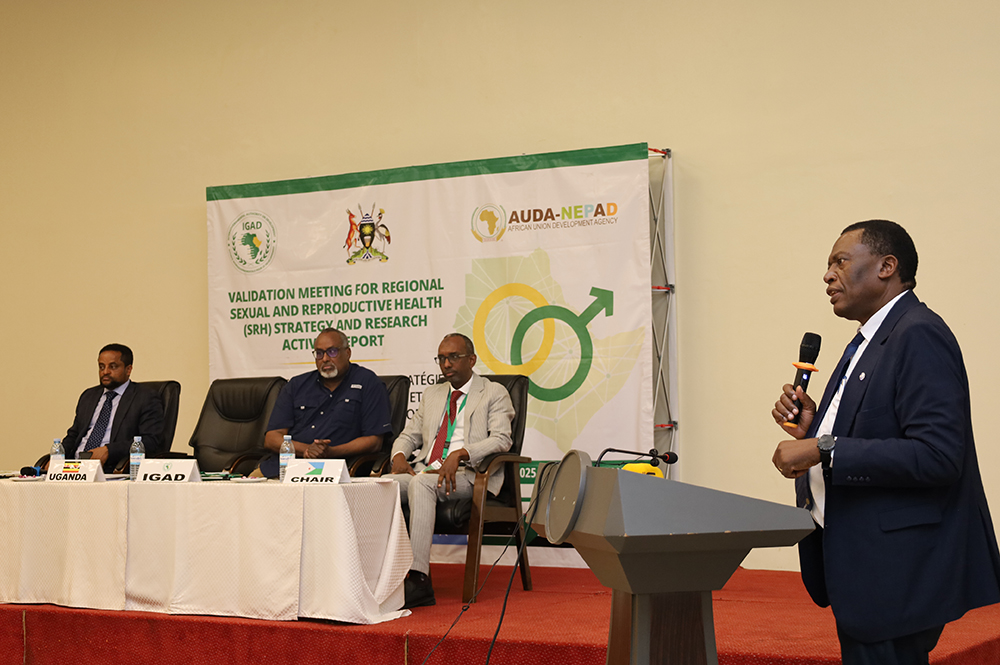IGAD regional strategy on sexual, reproductive health set for endorsement
The meeting, convened with financial backing from the African Union Development Agency (AUDA-NEPAD), marks a moment in the region’s public health agenda as member states reaffirm their commitment to Universal Health Coverage (UHC), the Sustainable Development Goals (SDGs), and the realisation of the demographic dividend.
Posing for a group photo are the representatives from IGAD’s seven member states: Uganda, Kenya, Ethiopia, South Sudan, Somalia, Djibouti, and Eritrea after their validation of the regional Sexual and Reproductive Health (SRH) Strategic Plan. (Courtesy)
By Nelson Mandela Muhoozi
Journalists @New Vision
__________________
In a bid to improve health outcomes in the East and Horn of Africa, the Intergovernmental Authority on Development (IGAD) has kicked off a three-day high-level validation workshop at the Best Western Hotel in Entebbe, Wakiso district.
The Tuesday, July 15, 2025, event brought together representatives from IGAD’s seven member states: Uganda, Kenya, Ethiopia, South Sudan, Somalia, Djibouti, and Eritrea, to validate the regional Sexual and Reproductive Health (SRH) Strategic Plan and chart a unified course for implementation under the Africa Demographic Dividend and Sexual and Reproductive Health (A2DSRH) programme.
The meeting, convened with financial backing from the African Union Development Agency (AUDA-NEPAD), marks a moment in the region’s public health agenda as member states reaffirm their commitment to Universal Health Coverage (UHC), the Sustainable Development Goals (SDGs), and the realisation of the demographic dividend.
“This is more than an initiative, it’s a regional commitment,” IGAD deputy executive secretary, Dr Mohamed Abdi Ware, said in his opening remarks that set the tone for the meeting by underscoring the significance of the moment.
“This programme is more than an initiative. It is a regional commitment to champion sustainable health solutions and empower our populations, particularly women and youth, with access to quality sexual and reproductive health services,” Ware said.
He added that the meeting would serve three vital functions: assessing progress by comparing planned activities with tangible outcomes, reviewing and validating the regional SRH Strategy and the accompanying Research Program Activity Study Report, and finally, endorsing actionable deliverables for implementation.
“These documents are not mere reports,” he said, and further noted, “they are the blueprint for how IGAD member states will collaborate to elevate health systems, reach underserved communities, and align with continental priorities for demographic dividend realisation.”
Ware extended deep appreciation to AUDA-NEPAD for its strategic investment and to IGAD member states for their technical contributions and shared ownership of the program.
The time to act is now
Representing AUDA-NEPAD, Dr Hagos Debeb lauded IGAD’s remarkable progress, revealing that IGAD has successfully implemented 80% of its planned activities under the A2DSRH programme, making it the most advanced Regional Economic Community (REC) in the initiative.
“This is a defining moment, an opportunity to align our shared ambitions with an actionable framework that addresses the region’s most pressing SRH challenges,” Debeb said.
He called on delegates to use the validation workshop not just to review progress but to reignite commitment to bold action.
“Sexual and reproductive health lies at the heart of inclusive development. It equips us to reduce maternal and newborn mortality, expand youth-friendly services, and promote gender equality. The time to act is now,” he asserted.
Debeb pledged AUDA-NEPAD’s continued support in transforming SRH from aspiration into reality for every individual in the IGAD region.
Representing Uganda, health ministry director of health services, Dr Charles Olaro. (Courtesy)
Djibouti shares realities and progress
Speaking as chair of IGAD, Dr Abdullahi Ibrahim from Djibouti painted a sobering yet hopeful picture of the SRH landscape in his country.
“First, there is a lack of comprehensive sexuality education. Social and religious beliefs often limit open conversations about sexuality, contraception, and family planning,” Ibrahim said.
“Second, there are gaps in laws and policies that make it difficult for girls to access reproductive health services,” he added.
Despite these challenges, he said Djibouti has recorded significant progress, including a reduction in female genital mutilation (FGM), a reduction of maternal deaths to 162 per 100,000 live births, in addition to achieving relatively low child marriage and teenage pregnancy rates compared to other IGAD members.
“This is a significant day, one on which IGAD has taken a bold and meaningful step forward in advancing sexual and reproductive health across our region,” he said.
Uganda’s commitment and context
Representing Uganda, the health ministry director of health services, Dr Charles Olaro, welcomed delegates and urged for practical and sustainable solutions to SRH challenges that burden the region.
“This programme is timely. Africa is going through a demographic transition, and we are grappling with high teenage pregnancy rates, abortion, HIV/AIDS infections, mental health issues, and NCDs,” Olaro said.
“These needs stretch an already burdened health system,” he added
He emphasised that external financing for health is dwindling and stressed the need for impactful, cost-effective interventions.
“In Uganda, the teenage pregnancy rate has stagnated at around 25% for over two decades. This is a serious development challenge that we must address if we hope to benefit from the demographic dividend,” he noted. “The net return on investment in SRH cannot be overemphasised.”
Olaro officially opened the meeting and commended AUDA-NEPAD for supporting the transformative programme.
Dr Edith Namutebi, IGAD head of peace and security at Uganda’s foreign affairs ministry, reinforced Uganda’s commitment to regional integration in the health sector.
Namutebi called on delegates to reflect on the 2005 Continental Policy Framework on Sexual and Reproductive Health and Rights, which was endorsed by African leaders in 2006.
The delegates are expected to validate the five-year SRH strategic plan and adopt a clear action plan that strengthens co-ordination, builds resilience in national health systems, and promotes inclusive health policies.
The strategy will guide regional alignment on adolescent health, gender equity, family planning, maternal care, and investments in youth empowerment—critical elements for unlocking the region’s demographic dividend.
“Let us use this platform to exchange ideas, share insights, and apply our collective expertise in shaping the future of sexual and reproductive health,” Ware urged in closing.
